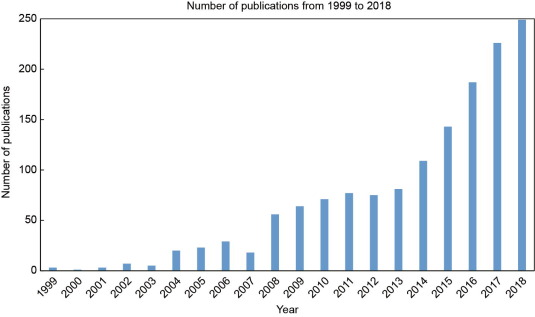The field of data science and analytics is revolutionizing healthcare at a rapid pace today. Innovations such as predictive analysis, genomic sequencing, drug research, and medical image analysis are just the tip of the iceberg when it comes to the applications of the technology in the medical space.
A study by Springer Nature revealed that by 2020, 40% of IoT-related technology would be used for health-related purposes, making it a $117 billion market. Healthcare organizations need a regular supply of talented data scientists to reform the industry and save countless lives.
Moreover, the combined domains of data science and healthcare analytics are research-intensive, as companies spend millions of dollars yearly to achieve better results.
This is evident by the increasing number of research publications about Artificial Intelligence and Biomedicine in the last 20 years, confirmed by a study conducted by the Westlake Institute for Advanced Study. The infographic below shows a sharp increase in the number of research papers published in 2014.

Source: Science Direct
Attracting Data Science Talent In Healthcare
Data scientists are in massive demand in today’s economy, and the healthcare industry is one of their biggest recruiters. An article by the Financial Times pointed out that machine learning specialists and data scientists occupy the first and second spots among professionals looking for a new job, at 14.3% and 13.4%, respectively.
Dr. Tal Patalon, head of Kahn-Sagol-Maccabi (KSM), a research and innovation center in Maccabi, Israel, says,
“We are a strong force in multiple global health areas. Our innovation and big data is based on advanced data sources and AI technologies; it has led us to found Israel’s largest Biobank, with over 800K samples collected; develop our epidemiological research department; and forge clinical research collaborations that result in significant life-changing achievements.”
The problem is not only in healthcare, as the great resignation of data scientists can be seen all across the economy.
Data scientists are leaving their current jobs for many reasons, including a lack of growth prospects, poor compensation, and a lack of exposure to new technologies. Hence, organizations should reform their work cultures and hiring processes to attract the most talented data scientists and think about ways they can be retained.
1) Focus on Employer Branding
Managing and influencing how job seekers, employees, and other vital stakeholders view you as an employer is known as employer branding. It entails everything you carry out to market your company as a top employer. Advertising and employer branding is essential for attracting the best healthcare analytics experts.
Both data science and healthcare are incredibly technical areas that place a strong emphasis on research and development. As a result, job prospects choose to work for healthcare organizations with a solid reputation for investing in research and high brand value among potential employees.
Nowadays, data science professionals aspire to participate in the current healthcare revolution and actively change the sector. For instance, it will be much more difficult for a business to recruit top healthcare data science personnel if it has a reputation for having a difficult work environment, little investment in research, and poor perks.
A survey of 366 respondents from high-profile Norwegian engineering firms indicated that innovation value, psychological value, application value, and social media positively relate to corporate reputation, which is positively linked to intentions to apply for a job.
2) Revamp Your Recruitment Process
The hiring procedure for data scientists in the healthcare industry is archaic. Given the technical nature of data science, effective hiring practices that prioritize candidate skill sets are essential. When employing healthcare scientists, many firms still take a generalist approach, which frequently backfires and prompts candidates to explore better opportunities.
Additionally, hiring managers are frequently chosen by businesses that lack data science and healthcare knowledge. Because of their lack of subject matter expertise, these recruiters often pass up brilliant data science candidates. Healthcare Companies looking for data scientists should redesign their hiring procedures to meet the demands of prospective employees better.
Companies looking for healthcare data scientists should redesign their hiring procedures to meet prospective employees’ demands better. This entails selecting hiring managers who can effectively communicate with the applicants while having a working knowledge of technical data and medical, and scientific concepts. Using structured interviews is another way healthcare companies can attract top data scientists from across the globe.
According to a Career Builder report, bad hires cost companies an average of $14,900, and more than 74% of recruiting managers have selected the incorrect candidate for a position.
A poor hire in the highly sophisticated field of medical data science may cost a business significantly when the consequences are this severe. For this reason, hiring managers should hold structured interviews to entice the top data science professionals to the healthcare industry.
3) Invest in Research and Development
Data science and medicine are both highly technological fields; therefore, businesses that wish to prosper must be creative to stay competitive. People aspire to excellence and a competitive workplace that focuses on creativity and innovation while working as data science professionals for a healthcare organization.
Businesses that spend extravagantly on R&D are more likely to draw top data science expertise from around the world. Professionals in healthcare data science seek employment with organizations with a reputation for being leaders in research and scientific development.
Attracting the best data scientists in healthcare will be challenging for firms with limited spending on research and development. Organizations must, of course, reinvent themselves as forward-thinking organizations committed to the most extraordinary levels of scientific innovation and progress. Such businesses will find it simpler to draw in and hire the top data science talent in healthcare worldwide.
The best data science employers also keep up with current industry changes and allow their staff members to participate in the technological revolution. To make their company seem the most lucrative, hiring managers should collaborate with the marketing team and focus on employer branding.
4) Provide Better Benefits
Some estimates suggest that data scientists working in the healthcare industry earn more than other sectors. The salary of an experienced and skilled healthcare data scientist in the US typically ranges between $123,276 and $152,489. This is considerably higher than the industry average but still, data scientists continue to leave their current companies for better opportunities.
Many employers focus too much on monetary benefits but disregard the importance of other perks that emphasize an employee’s mental and physical health. Businesses prioritizing their employees’ mental, physical, and emotional well-being are at a competitive advantage. Burnout is becoming a pervasive issue across industries; therefore companies should consider allocating days off for everyone to relax and recover, for example.
The Covid-19 epidemic has also encouraged remote working environments in many businesses, enabling healthcare data scientists to be creative at any time and at any location. Some firms have implemented a hybrid model, while others have switched to a four-day workweek schedule.
5) Foster a Learning Environment.
The field of data science is constantly evolving, and success calls for a dedication to lifelong learning. A Data Scientist in healthcare must always be learning new methodologies, tools, and strategies in order to excel in their position and keep the company ahead of the curve.
You must, at the very least, give your data science team time to investigate novel concepts and consistently improve their skills if you want to receive the most remarkable performance from them. Some companies sponsor candidates looking to pursue higher education, while others provide learning opportunities within the organization.
Get in touch with us at BenchPoint, our healthcare IT recruitment firm, to learn more about how you can attract the best data science talent in healthcare and quickly hire the best candidates!
We’ll be pleased to support you with even the most straightforward questions and assist you in creating workplaces that are employee-focused and result-driven throughout time.
